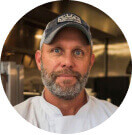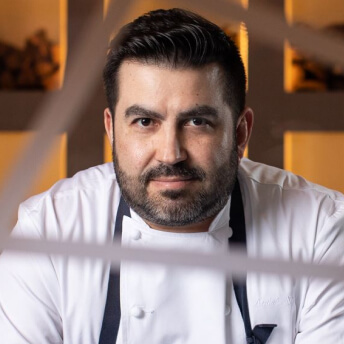Listen to This Article:
So you’ve put in countless hours as a line cook and now you’re ready to step into the role of professional chef. Chances are, you already know how to navigate a bustling kitchen, and you come to the table with a competitive skill set.
The good news for aspiring chefs and head cooks is that the U.S. Bureau of Labor Statistics predicts jobs to grow by 8% between 2023 and 2033, which is faster than the average job growth overall. However, these positions are often still competitive, due to the large pool of talented chefs and relatively small number of top positions available. In many cases, executive chefs are headhunted, making networking an essential skill. But regardless of how you get your foot in the door, you’ll still need to prove you’re the right chef for the job.
Along with demonstrating your rapid-fire technical skills—such as finely chopping an onion or preparing a decadent dinner course—you may need to answer a wide range of questions that showcase the breadth of your experience. To fully prepare, let’s unpack the top 10 chef interview questions hiring managers may ask.
10 Most Common Chef Interview Questions
Across all occupations, it’s estimated that only one in five job candidates are offered a position after an interview, with one survey finding that nearly half of all employers knew within the first five minutes of an interview whether the candidate was the right fit. Studying the restaurant, learning more about the business owner, and preparing for the likely questions you’ll be asked can help you make a strong first impression.
Your interview as a chef will likely cover a broad range of questions that delve into your personality, educational background, technique, problem-solving skills, future aspirations, and more. Here are some of the most common questions to prepare for:

It pays to go into your cheffing interview prepared.
1. When Did You Want to Become a Chef?
This type of question might offer the hiring manager insight into your personal ambitions and track record. Although you don’t want to recite a 20-minute recollection of your past, be prepared by coming up with a 1-2 minute overview or “elevator pitch” of your culinary journey.
This might look like starting with that formative childhood moment cooking a nostalgic family recipe, enrolling in culinary school, and perhaps a few career milestones or accolades you’re most proud of.
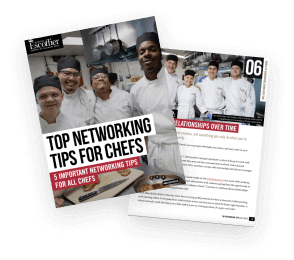
Get the Essential Networking Guide for Chefs
Boosting your networking skills can distinguish you in the culinary field. Discover how you can connect with influential industry professionals and unlock new job opportunities!
2. Why Do You Want to Work at This Restaurant?
Just like any interview, a hiring manager may want to see that you’ve done your homework on the restaurant before the interview. A candidate who exudes passion for a restaurant’s ethos might stand out from the rest of the competition.
When formulating your answer, think about the following:
- History regarding the restaurant’s owner
- Your dining experience at the restaurant
- Any menu items that stand out to you
- Any recent press about the restaurant
3. What Did Your Education and Hands-On Training Entail?
Many aspiring chefs will take this opportunity to highlight their formal culinary education and what type of curriculum they studied. For example, a student who graduated from a culinary school program at Auguste Escoffier School of Culinary Arts might elaborate on how their curriculum covered foodservice management, farm-to-table philosophies, purchasing and cost control, and more.
If you completed any industry externships, this is the time to discuss your experience! For example, hands-on externships are required at Escoffier and allow students to explore ancillary skills such as plating, ingredient sourcing, recipe development, and optimizing the guest experience.
*Information may not reflect every student’s experience. Results and outcomes may be based on several factors, such as geographical region or previous experience.
4. How Would You Describe Your Overall Cooking Style?
Most likely, a hiring manager will want to discern whether your style matches the restaurant’s overall essence. Although it doesn’t have to align perfectly, this question offers insight into your personal approach as a chef.
For example, if you’re interviewing at a plant-based restaurant, the hiring manager will likely look for a sustainably-focused cooking style that’s grounded in farm-to-table principles, or they may ask you about your approach to plant-based cooking. Your answer might also disclose whether you keep up with modern food trends, your preferred cuisine style, and perhaps a few signature dishes.
5. What Can’t You Live Without in the Kitchen?
Most professional chefs can’t properly function in the kitchen without a coveted utility belt. This chef interview question is an opportunity to demonstrate your technical skills and also underscore your cooking style.
For example, your answer might be, “Since I’m always cooking innovative, plant-based dishes, I can’t live without my sharp bench scraper.” Or if you’re a molecular gastronomist, you might find yourself turning to an immersion circulator for perfectly succulent sous vide proteins.
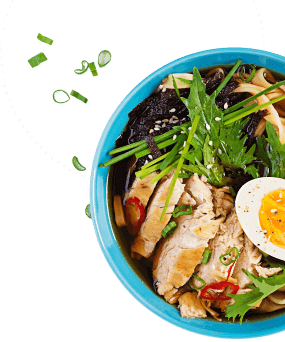
6. How Do You Conceptualize Menus?
As a chef, you might be expected to design restaurant menus to set the tone of the restaurant. This is a prime opportunity to elaborate on your strategy and touch on the following:
- Prioritizing menu items
- Choosing the right visuals
- Using seasonal items
- Preventing waste
- Cost control and menu pricing
7. How Do You Monitor the Quality of Dishes?
Most restaurants uphold quality control processes to ensure guest satisfaction. This is a critical skill professional chefs will likely need to monitor, so elaborate on what your own process looks like.
Perhaps you dive into your prior experience as a line cook and ways you ensured dishes reflected the restaurant’s overall standards. Your answer will also likely display your own attention to detail.
8. How Do You Manage Conflict Amongst Kitchen Staff?
Head chefs can do a lot to promote wellness and balance for the back of house team, which helps reduce burnout, turnover, and conflict. Although there’s no “one size fits all” answer to this one, you may want to elaborate on your conflict-management process. Most likely, the hiring manager will be looking for empathy, diplomacy, and team-based communication.
Students who complete the Culinary Arts program at Escoffier can complete a culinary entrepreneurship course in foodservice management that covers topics around business ethics, management, and leadership.
9. How Do You Handle Not Ordering the Right Amount of Ingredients?
Not only is this a common problem-solving chef interview question, but it may also highlight your training in purchasing and cost control, which includes the basic food cost calculation.
You might want to elaborate on your personal procedure when variance figures are off, which may include how you handle food waste. For example, how did you modify your inventory management to ensure an accident like this didn’t occur again?
*Information may not reflect every student’s experience. Results and outcomes may be based on several factors, such as geographical region or previous experience.
10. What are Your Future Ambitions as a Professional Chef?
When it comes time to answer this question, be as candid as possible, and don’t hold back on your individual passions! Perhaps you see yourself as an acclaimed executive chef, cookbook author, or cooking contest competitor. If you don’t know where you see yourself, it may help to review some of the best books written by chefs.
*Information may not reflect every student’s experience. Results and outcomes may be based on several factors, such as geographical region or previous experience.
Try your best to articulate your ideal vision and don’t forget to express gratitude for the opportunity to interview at the end.
Tips for a Successful Culinary Job Interview
Now that you know the top chef interview questions, here are some other helpful tips to consider ahead of time.

Know who you are as a chef and the strengths you’ll bring to the job.
- It’s normal to feel an outburst of nerves before interviewing for a chef position—especially if it’s at your dream restaurant. Hiring managers are usually well aware of this and will set the tone with a few icebreaker questions to get you warmed up and showcase your personality.
- As you prepare for this interview, carve out time to review the fundamental techniques, such as specific knife cuts you may have explored in culinary school. Dress to impress and always have your essentials handy, such as your knife kit and chef apron.
- You might get several problem-solving questions that require you to bring up mistakes you previously made in the kitchen. It’s likely the hiring manager will want to hear about your problem-solving approach, lessons learned, and ways to prevent that mistake from happening again. Don’t forget to end on a positive note!
- According to Brian Blum and Evan Kaplan, two expert recruiters from Gecko Hospitality, one of the keys to a standout cheffing interview is bringing your personality and stories. For example, tell the story about how you finally perfected a dish that you struggled with for months, or how you navigated the craziest Valentine’s Day dinner service of your career.
- If you’re asked to prepare a series of dishes in the tasting interview, it might be best to stick with what you know and use ingredients that are familiar to you.
- How to Prepare for an Executive Chef Interview
- The Difference Between a Professional Cook and Chef
- Is Being a Chef a Good Career Choice?
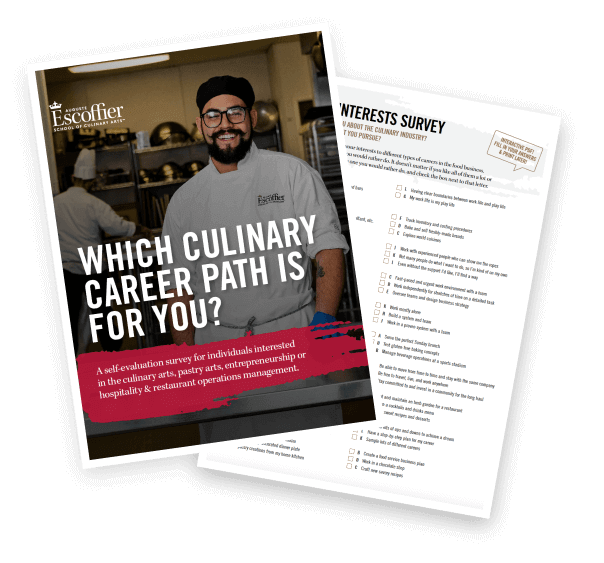
Take the Culinary Career Survey
We’ve compiled a checklist of all of the essential questions into one handy tool: career options, culinary interest surveys, educational opportunities, and more.
Prepare for Chef Interview Questions
Overall, hiring managers not only evaluate your technical skills, but they may also consider ambition, passion, coachability, personality type, and depth of knowledge. If you want to potentially become a high-quality candidate for a chef position, you can start by gaining valuable training at an accredited culinary school, such as Auguste Escoffier School of Culinary Arts.
To discover more about Escoffier’s culinary programs, contact us today to speak with our admissions department.
WAS THIS ARTICLE USEFUL? TRY THESE NEXT:
This article was originally published on January 18, 2023 and has since been updated.
*Information may not reflect every student’s experience. Results and outcomes may be based on several factors, such as geographical region or previous experience.

